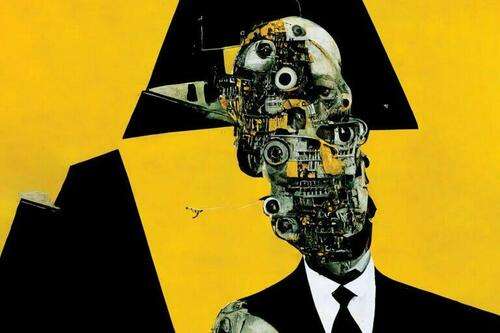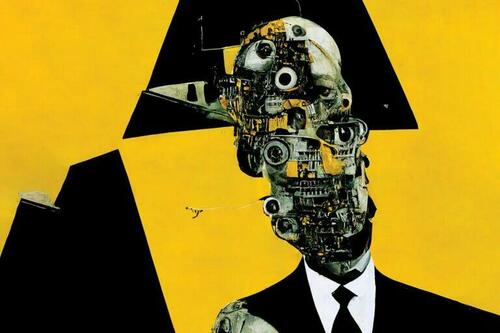Authored by Brandon Smith via Alt-Market.us,
It’s no secret that globalist institutions are obsessed with Artificial Intelligence as some kind of technological prophecy.
They treat it as if it is almost supernatural in its potential and often argue that every meaningful industrial and social innovation in the near future will owe its existence to AI.
The World Economic Forum cites AI as the singular key to the rise of what they call the “Fourth Industrial Revolution.”
In their view, there can be no human progress without the influence of AI algorithms, making human input almost obsolete.
This delusion is often promoted by globalist propagandists. For example, take a look at the summarized vision of WEF member Yuval Harari, who actually believes that AI has creative ability that will replace human imagination and innovation. Not only that, but Harari has consistently argued in the past that AI will run the world much better than human beings ever could.
Harari’s examples of AI creativity might sound like extreme naivety to many of us, but he knows exactly what he is doing in misrepresenting the capabilities of algorithms. Games like chess and Go are games of patterns restricted by rules, there only so many permutations of these patterns in any given scenario and AI is simply faster at spotting them than most humans because that is what it is designed to do by software creators. This is no different that solving a mathematical equation; just because a calculator is faster than you does not mean it is “creative.”
There is a big difference between cognitive automation and cognitive autonomy. AI is purely automation; it will play the games it is programmed to play and will learn to play them well, but it will never have an epiphany one day and create a new and unique game from scratch unless it is coded to do so. AI will never have fun playing this new game it made, or feel the joy of sharing that game with others, so why would it bother? It will never seek to contribute to the world any more than it is pre-programmed to do.
The manner in which globalists hype AI is very tactical, however. When Harari claims that many people will become part of the “useless class” once AI takes over the economy, he is hinting at another globalist ideology based on elitism – Transhumanism. The goal of transhumanism is to one day merge human bodies and human minds with technology and AI, and only a limited group of people will have the resources to accomplish this (the globalists).
Are you afraid of becoming part of the “useless class”? Well, if you scrape and beg and serve every whim of the elitist establishment then maybe you will be lucky enough to get implants which allow you to interface with AI, and then your future employment and “usefulness” will be secured. Doesn’t that sound nice?
But, like all the visions of narcissists there are delusions of godhood and then there is reality. I continue to have serious doubts that AI will ever be legitimately autonomous or legitimately beneficial to humanity in any way beyond having the ability to calculate quickly within mathematical rules. Speedy data analysis can be useful in many areas of science, but it’s not really proof of autonomous intelligence, and algorithms can be predictive but not any more predictive than human beings looking at the same statistical data. There is nothing about AI that is impressive when one considers what little it actually accomplishes.
AI is a toy, a parlor trick, not a living entity with independent observations and conclusions. And, it’s certainly not a god-like being capable of showering us with scientific ambrosia or building a perfect civilization. I predict that a society dependent on AI will actually stagnate and remain trapped in stasis, never really inventing anything of much value and never progressing. It will only ever be concerned with homogenization – The merging of people with the algorithm. That is where ALL the society’s energies will go.
As a point of reference to why AI is overrated, all we have to do is look at the behavior of AI programs like ChatGPT; the algorithm has been discovered on numerous occasions to contain extreme political biases always leaning to the far-left, including biases based in beliefs not backed in any way by scientific evidence. Interestingly, ChatGPT will even at times display a seemingly hostile response to conservative concepts or inconvenient facts. The bot will then DENY it is giving personal opinions even when its responses are consistently pro-leftist.
How is political bias possible for a piece of software unless it was programmed to display that bias? There is no objectivity to be found in AI, nor any creativity, it will simply regurgitate the personal opinions or biases of the people that created it and that engineered how it processes data.
Unlike a typical human teenager that seeks to adopt the opposing social or political beliefs of their parents in order set themselves apart, AI will never metaphorically dye its hair blue, pierce its nose and proclaim itself vegan – It will always do what its creators want it to do. Another example of this dynamic is AI art, which essentially steals the stylistic properties of numerous human artists entered into its database and copies them. While imitation might be considered the highest form of flattery, it’s not the same as creativity.
This might not sound like much of a problem when it comes to a simple chatbot or the making of cartoons. But, it’s a massive problem when we start talking about AI influencing social and governmental policies.
The globalists argue that AI will be everywhere – In business, in schools, in corporate operations, in scientific enterprises, and even within government. It MUST run everything. Why? They don’t really say why other than to make vague promises of incredible advancements and previously unimaginable benefits. To date, there have been no profound innovations produced by AI, but I suppose pro-AI propagandists will say that the golden age is “right around the corner.”
The uses for AI are truly limited to helping humans with simple tasks, but there is still a cost. A self driving car might be great for a person that is physically handicapped, but it can also be a crutch that convinces a population to never learn to drive themselves. By extension, AI is in a lot of ways the ULTIMATE crutch which leads to ultimate tyranny. If people are convinced to hand over normal human processes and decision making opportunities to automation, then they have handed over their freedoms in exchange for convenience.
More importantly, if algorithms are allowed to dictate a large portion of choices and conclusions, people will no longer feel a sense of accountability for their actions. Regardless of the consequences, all they have to do for the rest of their lives is tell themselves they were only following the suggestions (or orders) of AI. The AI becomes a form of external collectivized conscience; an artificial moral compass for the hive mind.
But who will really be controlling that moral compass and bottle-necking the decisions of millions of people? Will it be the AI, or the elites behind the curtain that manipulate the algorithm?
For many people this probably sounds like science fiction. Yes, there have been many fictional imaginings of what the world would be like in the shadow of AI – I would highly recommend the French New Wave film ‘Alphaville’ as one of the most accurate predictions on the horrors of AI and technocracy. However, what I am warning about here is not some far off theoretical future, it is already here. Take a look at this disturbing video on AI from the World Government Summit:
These are the blatant goals of globalists in plain view, with a sugar coating to make them more palatable. I wrote about the motivations of the elites and their worshipful reverence for AI in my article ‘Artificial Intelligence: A Secular Look At The Digital Antichrist. That piece was focused on the philosophical drives that make globalists desire AI.
In this article I want to stress the issue of AI governance and how it might be made to appeal to the masses. In order to achieve the dystopian future the globalists want, they still have to convince a large percentage of the population to applaud it and embrace it.
The comfort of having a system that makes difficult decisions for us is an obvious factor, as mentioned above. But, AI governance is not just about removing choice, it’s also about removing the information we might need to be educated enough to make choices. We saw this recently with the covid pandemic restrictions and the collusion between governments, corporate media and social media. Algorithms were widely used by web media conglomerates from Facebook to YouTube to disrupt the flow of information that might run contrary to the official narrative.
In some cases the censorship targeted people merely asking pertinent questions or fielding alternative theories. In other cases, the censorship outright targeted provably factual data that was contrary to government policies. A multitude of government claims on covid origins, masking, lockdowns and vaccines have been proven false over the past few years, and yet millions of people still blindly believe the original narrative because they were bombarded with it nonstop by the algorithms. They were never exposed to the conflicting information, so they were never able to come to their own conclusions.
Luckily, unlike bots, human intelligence is filled with anomalies – People who act on intuition and skepticism in order to question preconceived or fabricated assertions. The lack of contrary information immediately causes suspicion for many, and this is what authoritarian governments often refuse to grasp.
The great promise globalists hold up in the name of AI is the idea of a purely objective state; a social and governmental system without biases and without emotional content. It’s the notion that society can be run by machine thinking in order to “save human beings from themselves” and their own frailties. It is a false promise, because there will never be such a thing as objective AI, nor any AI that understand the complexities of human psychological development.
Furthermore, the globalist dream of AI is driven not by adventure, but by fear. It’s about the fear of responsibility, the fear of merit, the fear of inferiority, the fear of struggle and the fear of freedom. The greatest accomplishments of mankind are admirable because they are achieved with emotional content, not in spite of it. It is that content that inspires us to delve into the unknown and overcome our fears. AI governance and an AI integrated society would be nothing more than a desperate action to deny the necessity of struggle and the will to overcome.
Globalists are more than happy to offer a way out of the struggle, and they will do it with AI as the face of their benevolence. All you will have to do is trade your freedoms and perhaps your soul in exchange for never having to face the sheer terror of your own quiet thoughts. Some people, sadly, believe this is a fair trade.
The elites will present AI as the great adjudicator, the pure and logical intercessor of the correct path; not just for nations and for populations at large but for each individual life. With the algorithm falsely accepted as infallible and purely unbiased, the elites can then rule the world through their faceless creation without any oversight – For they can then claim that it’s not them making decisions, it’s the AI. How does one question or even punish an AI for being wrong, or causing disaster? And, if the AI happens to make all its decisions in favor of the globalist agenda, well, that will be treated as merely coincidental.

